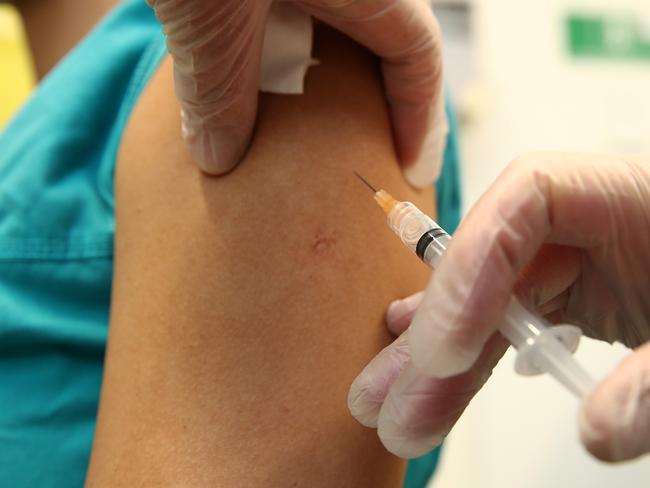App alerts online users about anti-vaccination material, fake news
“Dr Google” can be a hotbed of anti-vax fear mongering and fake news, but the internet is about to get a shot in the arm for truth as a NSW scientists develop online tool to inoculate against bogus information. HOW IT WORKS
NSW
Don't miss out on the headlines from NSW. Followed categories will be added to My News.
Australian scientists are developing an internet tool to inoculate against misinformation about vaccinations lurking online.
Epidemiologist Associate Professor Adam Dunn, from Macquarie University Australian Institute of Health Innovation, has developed the online “pre-bunking” app which will alert people when they are directed to anti-vaccination material, fake news or sites that are not based on credible science.
“Do your own research” is the catchcry of anti-vaxxers but the internet is a breeding ground for misinformation about vaccination which has led to a decline in vaccination rates in some pockets around the world and Australia.

The resurgence of measles in many western countries where it was once eliminated is partly due to misinformation spread online.
A/Prof Dunn said his pre-bunking tool will show a pop up that cautions when someone is about to link to information that is not credible.
MORE FROM JANE HANSEN
Free fertility service so cancer patients can have kids
Baby with heart on wrong side caught up in hospital stoush
“If you are accessing a website or social media, it will just pop up and alert people about when they are about to link to misinformation and explain why the information at the end of the link might not be credible.
“When we have someone who is vaccine hesitant and asking questions they can go online and find good and bad information.
“The idea is like how vaccines inoculate us against diseases, we are developing software tools that will inoculate people against misinformation,” A/Prof Dunn said.
“If you are accessing a website or social media, it will just pop up and alert people about when they are about to link to misinformation and explain why the information at the end of the link might not be credible.
“When we have someone who is vaccine hesitant and asking questions they can go online and find good and bad information.
“The idea is like how vaccines inoculate us against diseases, we are developing software tools that will inoculate people against misinformation,” A/Prof Dunn said.
According to Google data, search interest in measles is the highest on record in Australia in 2019 and has doubled in the past 12 months.
Search interest for vaccines and MMR — or measles vaccine — are also at an all-time this year and double that of last year.
Despite research categorically disproving any link between vaccines and autism, according to Google Trends data, search interest for “vaccine” and “autism” has also increased in 2019 in Australia.
A form of artificial intelligence called machine learning will be used to identify which sites are inaccurate.
“We use machine learning to teach computers how to critically appraise webpages and social media posts, in the way an expert would but we get a machine to do it and that way we can spot misinformation before it emerges and becomes entrenched in certain communities and we do it at scale,” he said.

While hard core anti-vaxxers will unlikely be moved, the idea is aimed at people who are vaccine hesitant and looking for legitimate answers to their questions.
“They might be misinformed because of where they live, who they listen to, so the focus is empowering people to protect themselves against misinformation so they can recognise it when they see it and do not pass it along within their communities,” A/Prof Dunn said.
A previous study A/Prof Dunn collaborated on analysed Twitter posts on the Gardasil vaccine for HPV and showed a link between the types of information spread and the levels of vaccine coverage.
“We found an association between the topics people were exposed to and the coverage rates of HPV vaccines. There is an association between the kind of information that floats around in a city of a state and the actual (vaccine) coverage in those places,” he said.
“We need to look at communities at risk where misinformation is a disproportionate amount of their information diets and that is true of places like Mullumbimby and some online communities like parenting forums. I hope to give people the tools to stop misinformation spreading in those risky communities,” he said.
Pro-vaccination mum Mandy Ling Khoo lives in Byron Bay and is annoyed at the level of conspiracy and misinformation in the shire that has one of the lowest vaccination rates in the country.

“It would be good tool for those new young mums and parents who have no idea and want information, because we are living in anti-vax ground zero her, but I don’t think it would tackle those with the strongly believe vaccines are out to kill us, they’re the same people who believe in chemtrails,” Ms Ling Khoo said.
Maia Marsh, a Dulwich Hill mother of two who grew up in Nimbin, was not convinced such a tool would work.
“People who are anti-vax are distrustful of the authorities who would decide this, it would work for me, but for those with underlying distrust, I don’t think you can have the conversation with them. It’s a nice idea but I don’t think it will convince the people that need convincing,” she said.
The tool is a finalist in the Data Innovation category of Research Australia’s Health and Medical Awards held in November.
Originally published as App alerts online users about anti-vaccination material, fake news
